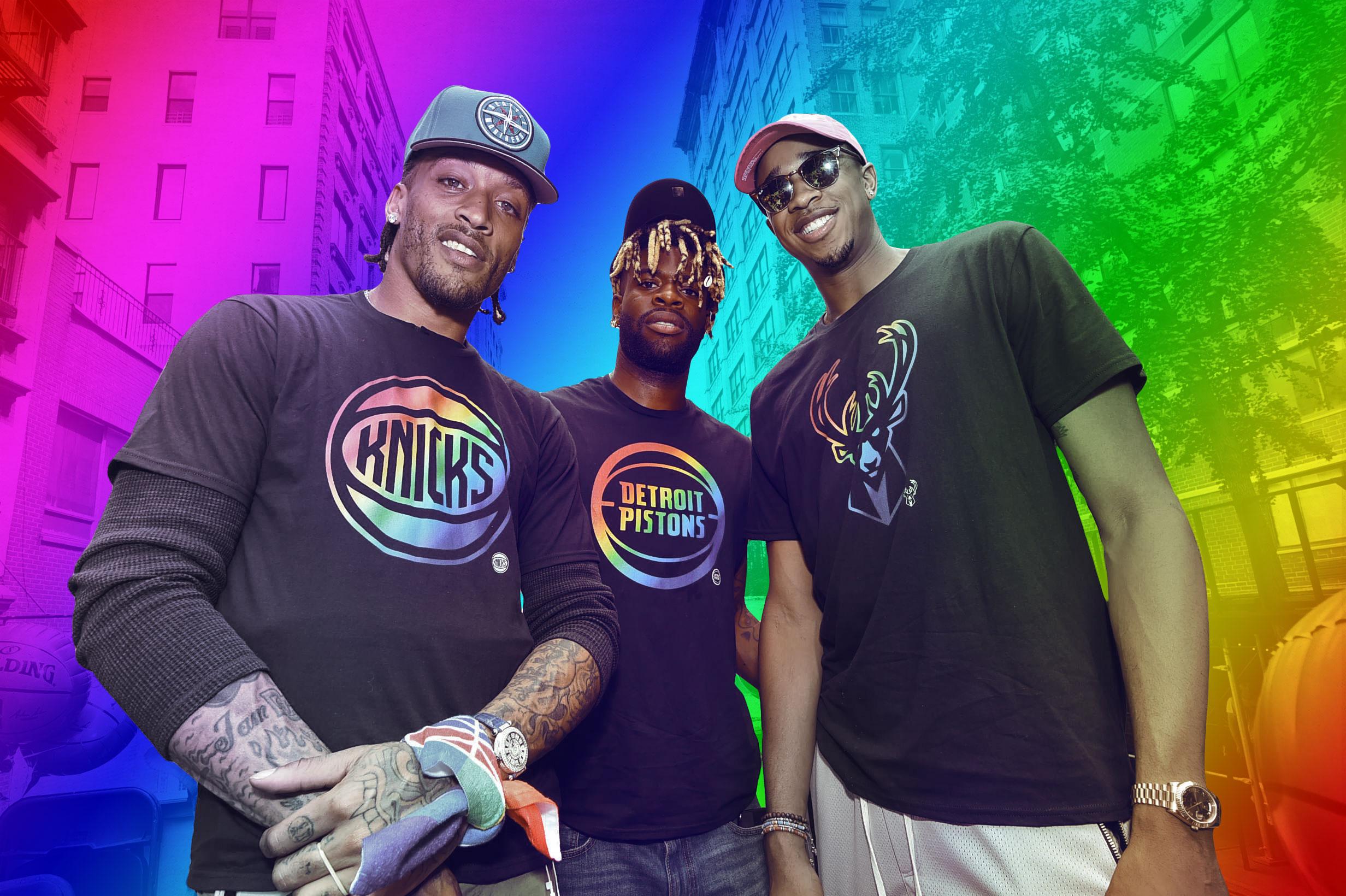
The day began not on the streets of midtown Manhattan, but quietly, in a hotel room, seated across from Detroit Pistons swingman Reggie Bullock. The series of events that led him to New York on Pride Sunday began four years ago, when his transgender sister, Mia Henderson, was murdered. The tragic loss is still difficult for him to talk about, but through it, he’s actively—and publicly—found ways to honor her legacy, by educating himself about the LGBTQ community and finding ways to educate others.
Just this past April, he tweeted about wanting to play in a rainbow-colored jersey as a way “to incorporate #LGBTQ into sports.” In May, he spoke at the GLAAD Media Awards, discussing his plans to be a public ally to the trans community. And in early June, he released a video with The Players’ Tribune recounting his relationship with Mia titled “For My Sister.” The title subtly reveals his growth and understanding—in the weeks following her untimely death, Bullock still referred to his sister as his brother.
Three weeks after the video was released, Bullock was in New York, to attend his first Pride March. And it wasn’t just him. Walking into Bullock’s hotel room an hour before the march, I was greeted by a pillow fight between him and his 5-year-old son, Treyson. “It’s not just my first time, but it’s our first time,” he says. “And it’s his first time being around so many people that’s a part of the community. He’s going to have a lot of questions, but I’m sure it won’t be nothing I can’t handle.”
There was a nervous excitement in the room, not knowing what the day would hold for him or Treyson. But in his cut-off Pistons rainbow T-shirt and fashionably tattered jean shorts, Bullock was ready. And on his feet, airbrushed, was his sister.
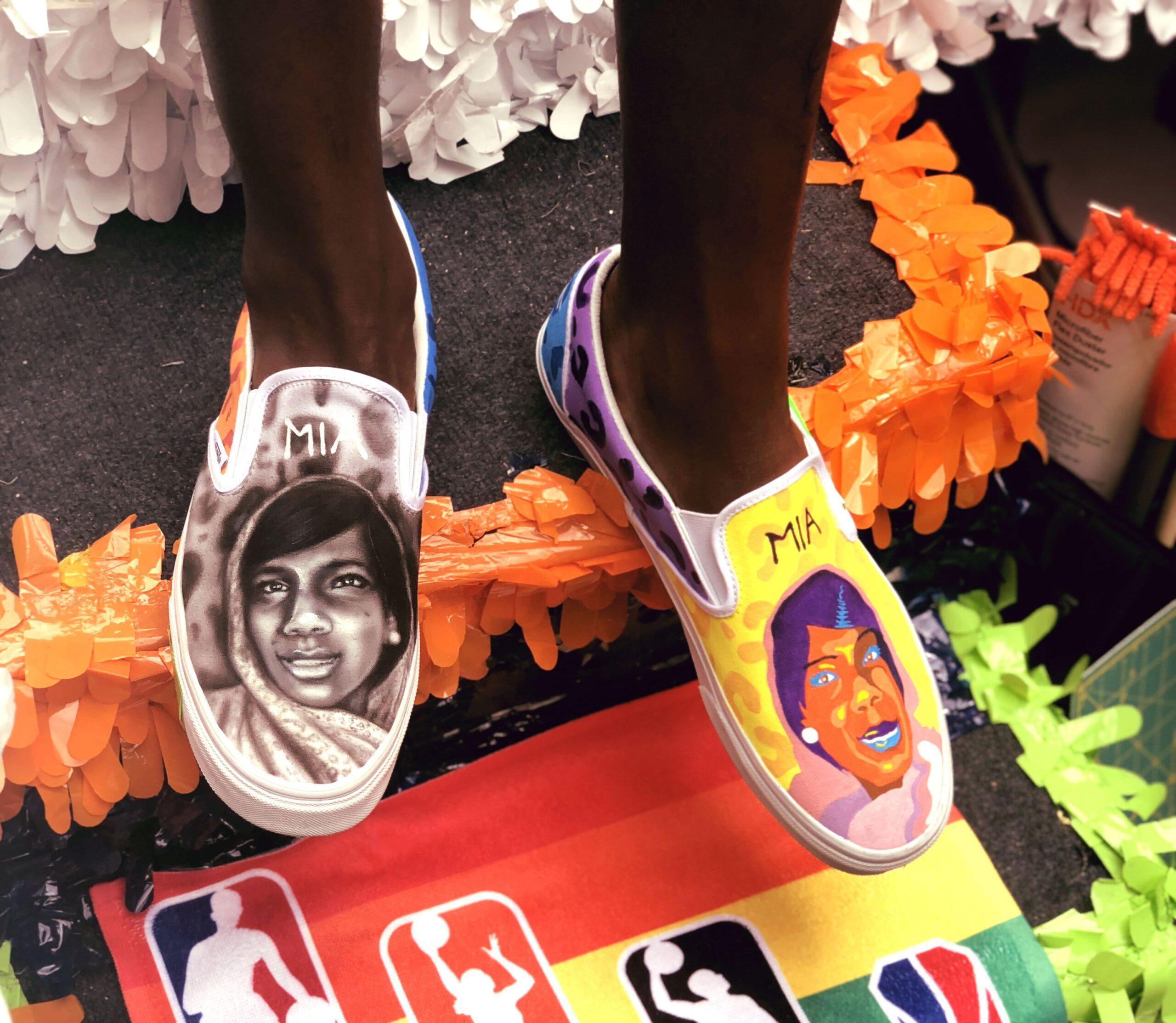
One of the reasons he was so excited was because he knew how much Mia would have enjoyed Sunday.
“I know that my sister would have loved being here—she never experienced a Pride Parade before,” Bullock tells me. “She was born in Baltimore, Maryland, raised in North Carolina, so we never made it to New York City. When I was younger, we grew up in poverty, so we didn’t have money to actually travel outside of the state to actually see all of these different types of things. Honestly, I never knew about a Pride Parade, period, until they just told me about it. So I’m in good spirits because I feel like she’s here.”
One of the lessons that I actually learned about my sister was how nice it was to live so carefree. You should live free and be free as a human being. She was true to who she was and what she meant to people.Reggie Bullock
The father-and-son tandem had to get ready for the march, so I made my way to the float. This was the third appearance for the float since its trailblazing debut in 2016—the first for a major American sports league at the event. As the structure began to fill with passengers, I was reminded that while this will primarily be identified as an NBA venture, the league would not be arriving at this moment—and LGBTQ activism, or activism of any kind—if not for the WNBA. The league’s unabashed and unwavering commitment to human rights, from Pride nights for every franchise to being pioneers on how a league stands up against racial injustice, undergirds and informs so much of what the NBA does in the world.
The NBA is a better league when it follows the WNBA’s lead. Sunday was no different. The tone of the day was set before the float had budged. When the music started, New York Liberty legends Teresa Weatherspoon and Kym Hampton and WNBA president Lisa Borders began moving and bopping and taking auntie selfies. And when that Cheryl Lynn came on, the trio showed out, two-stepping in perfect sync (each on their own stair) like they were at Essence Fest (waiting on Charlie Wilson).
The float kept up that energy, as Bullock found his perch alongside the Knicks’ Michael Beasley and the Bucks’ John Henson. Craig Robinson, the New York Knicks’ VP of player development, was up there, as was Jason Collins, the openly gay ex-NBA center, and the Knicks’ new coach, David Fizdale, alongside his wife, Natasha.
There was a lot of juice on the float, but it wasn’t nearly complete. Once commissioner Adam Silver and his wife, Maggie, climbed aboard, it was time for the main event: Bill Kennedy.
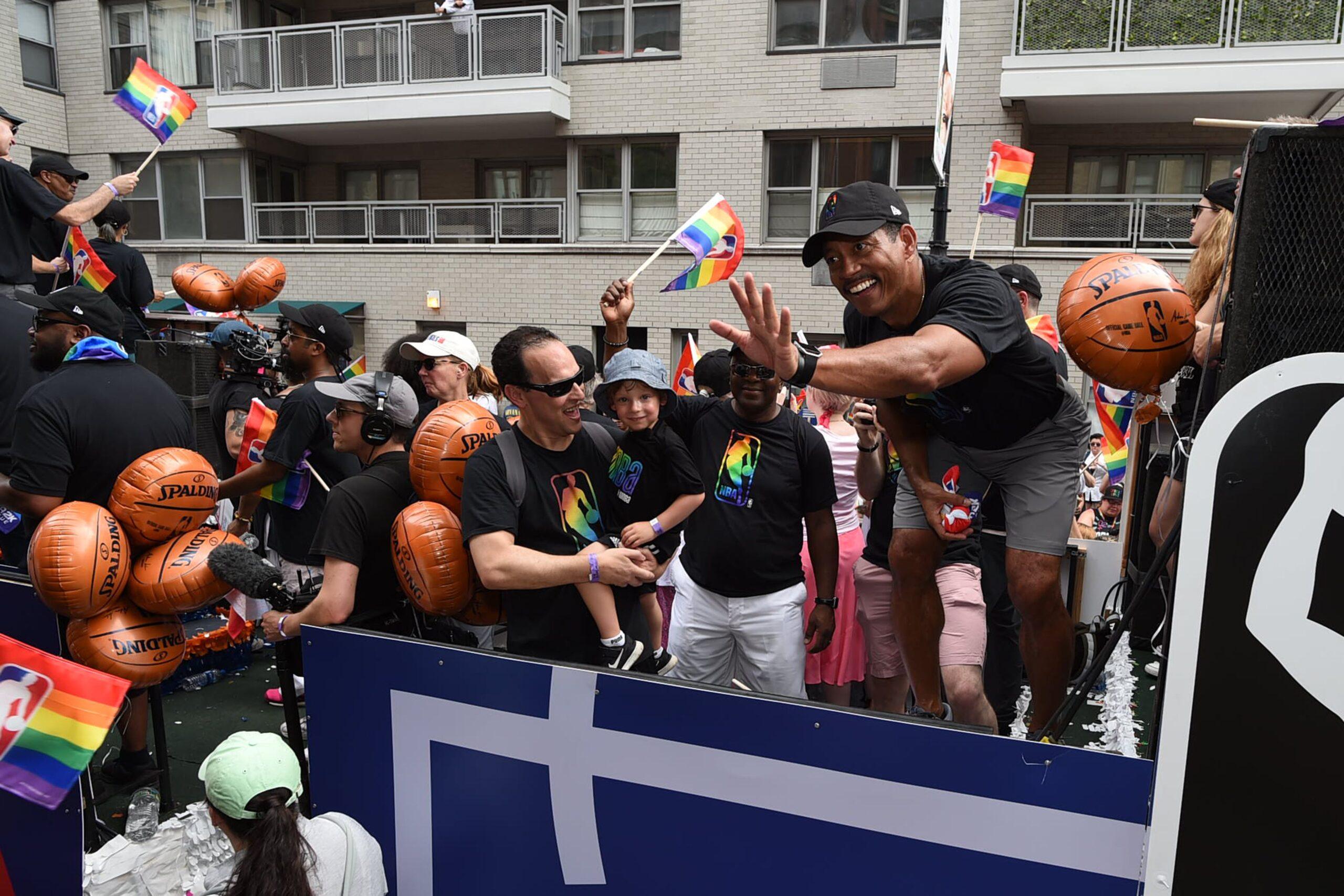
Let me stop here, and say—the BeyHive is to Beyoncé what I now am to Bill Kennedy.
For 20 years, Bill Kennedy has been a referee in the NBA. On two documented occasions, a player (Rajon Rondo) and a coach (Doc Rivers) reportedly used a gay slur to address Kennedy during a game. Following the Rondo incident in 2015, Kennedy came out.
As our float made its way to the West Village, I tried to keep an eye on Bullock. But I couldn’t. Because Bill Kennedy was conducting himself as though he were the grand marshal of the entire march.
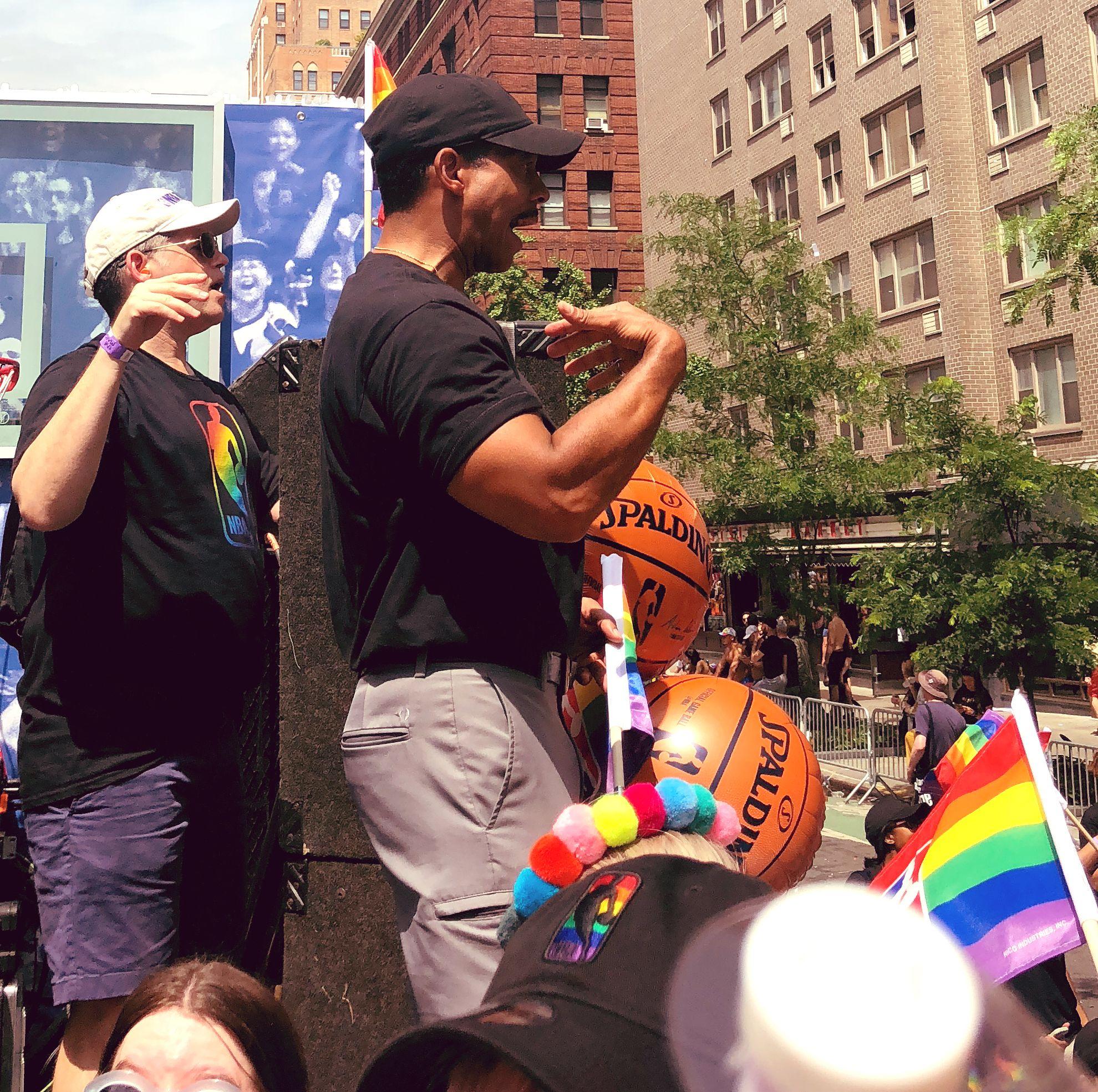
You could sense the importance of the day for him. Sure, he was a character, effusively doing the royal wave, one leg up on the side of the float as though he were looking out over his private balcony. But there were also the moments when he’d make eye contact with someone in the massive crowd and point at them, and they would point back, and an inaudible conversation with just points and air hugs would take place. Or the moments when he would just look out, arms crossed, smiling.
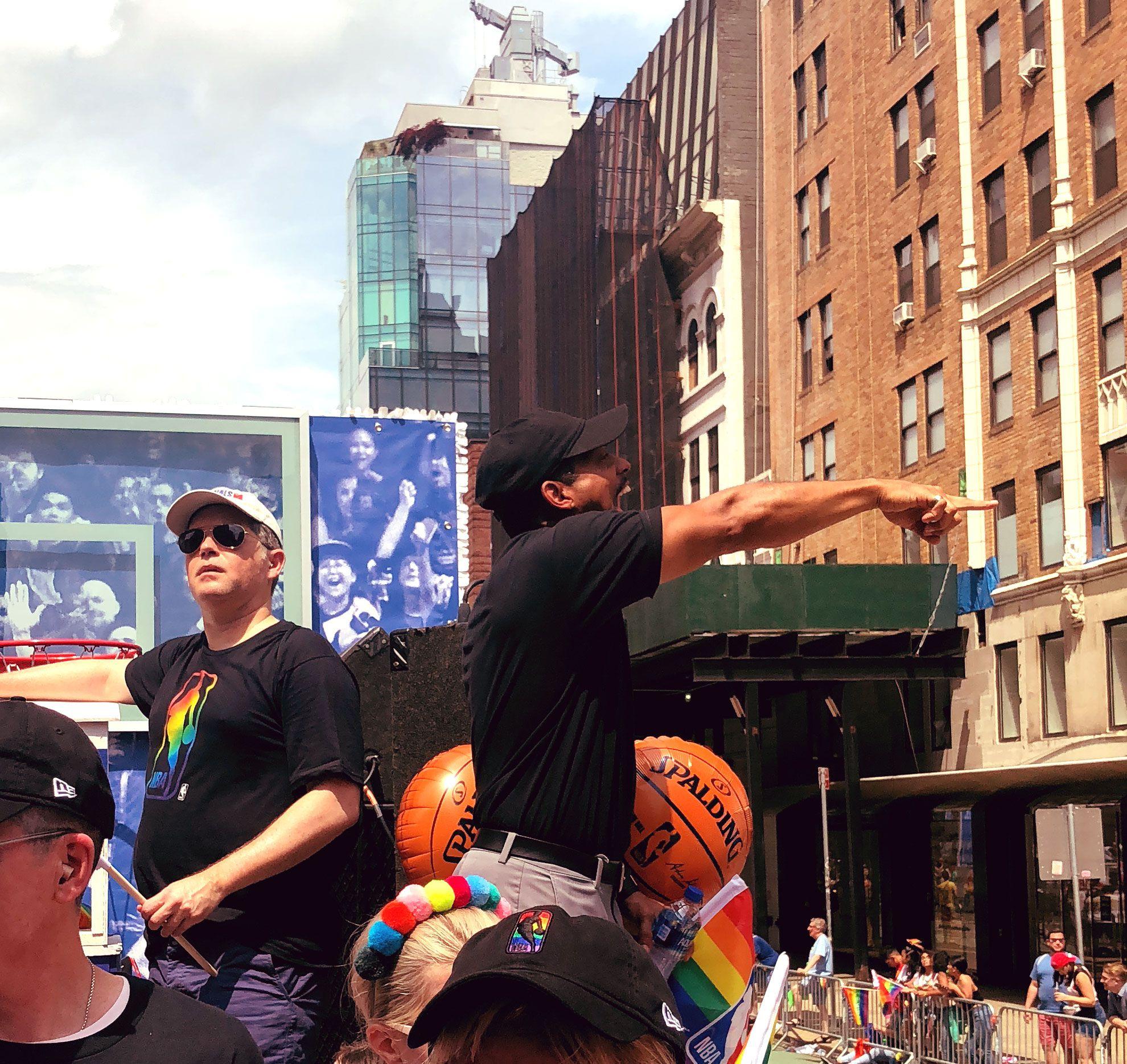
If we’d get caught in a float traffic jam and a song he liked (all of them) was playing, he’d pick someone in the crowd and start singing, first at them, and then with them.
The WNBA trio stood at the bow of the float, while Kennedy remained at his perch on the stern. That orientation proved ideal: Either way you looked and any cue you were looking to receive was filled with love and freedom. And it was contagious.
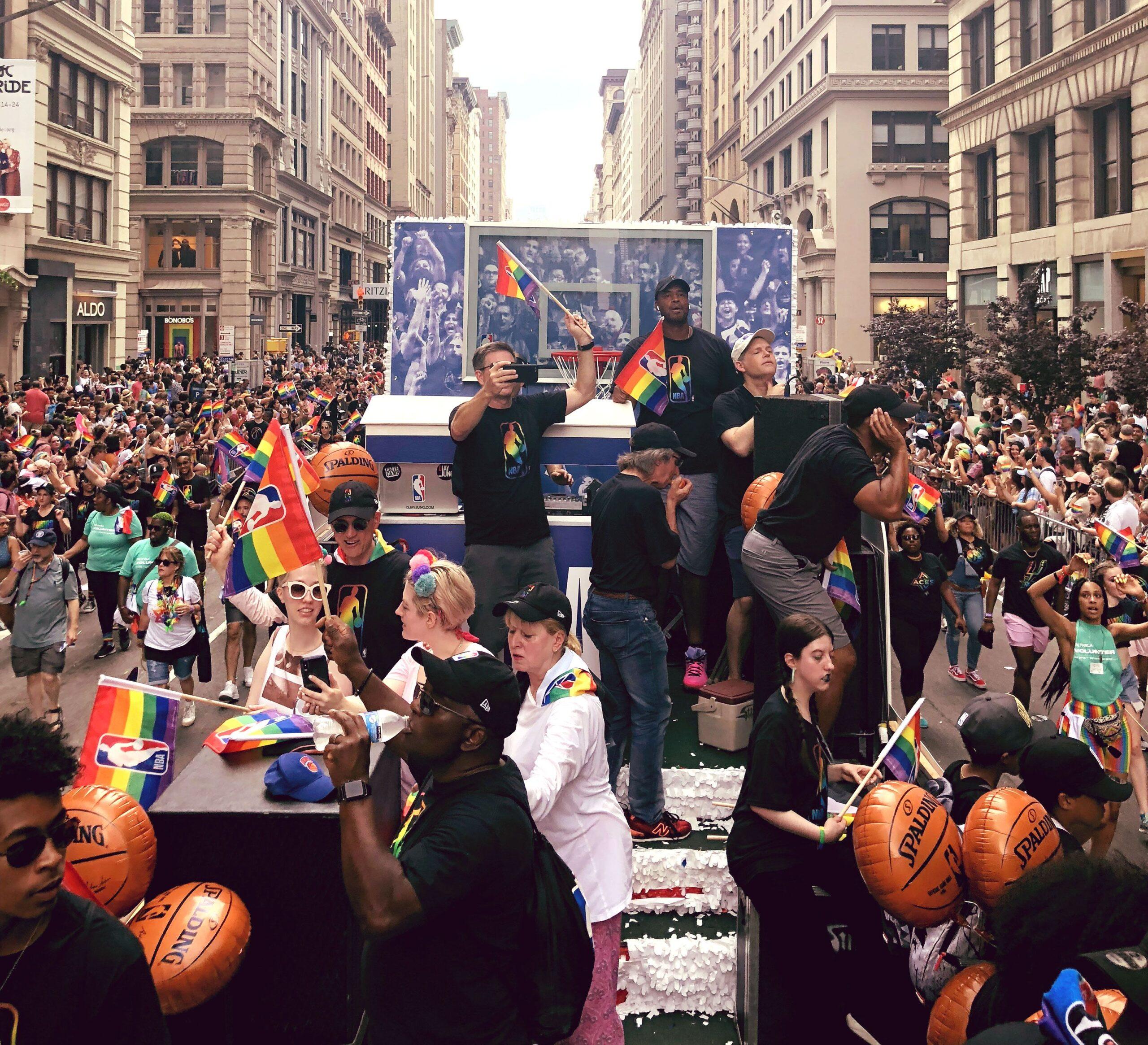
This is precisely the feeling Bullock wanted to create to honor his sister. “One of the lessons that I actually learned about my sister was how nice it was to live so carefree,” he says. “You should live free and be free as a human being. She was true to who she was and what she meant to people.”
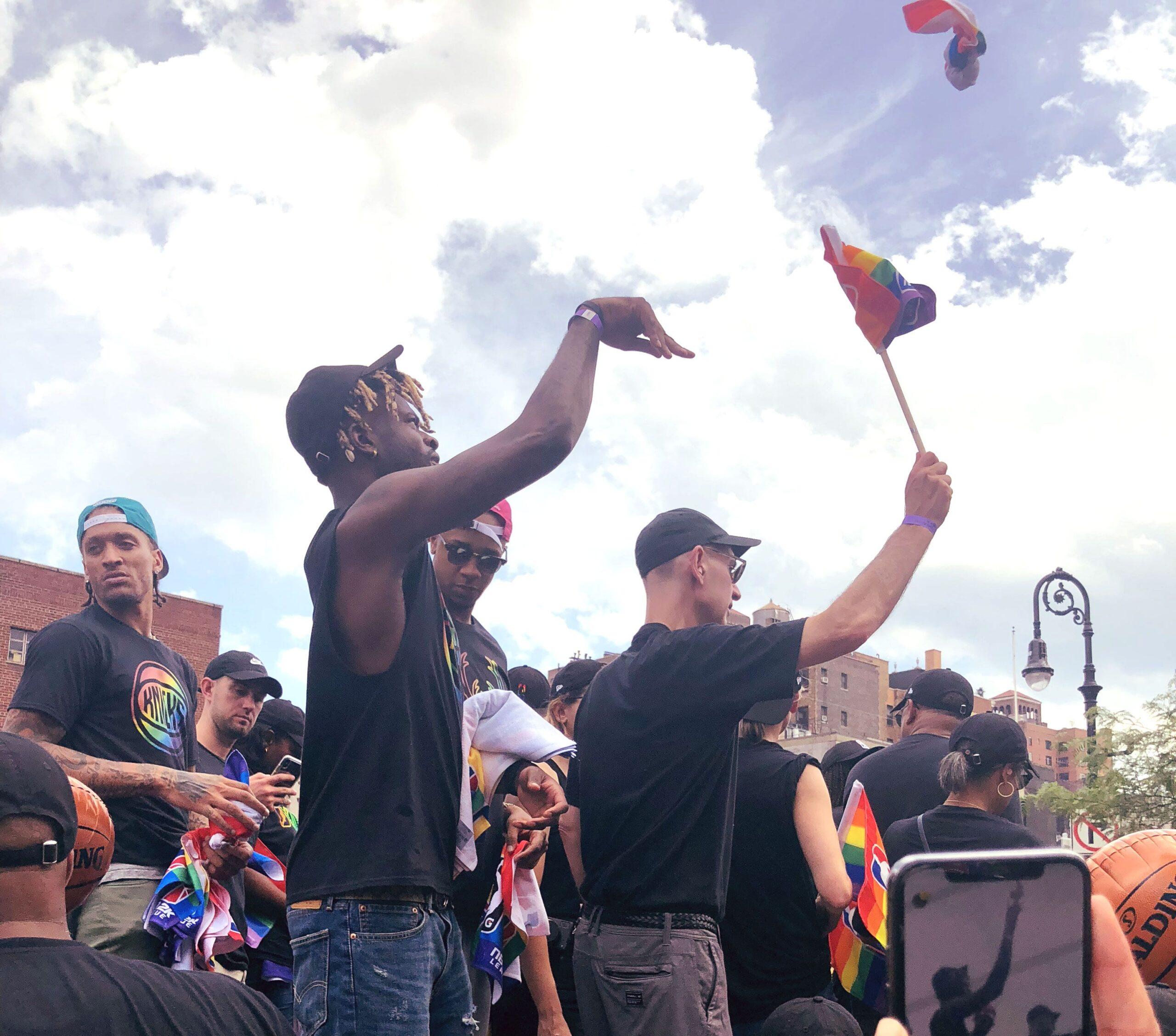
As the float traveled through the West Village, hundreds of people stood on each side of the float, dancing to our music, arms out as everyone threw NBA/WNBA rainbow towels into the crowd. At one point, Michael Beasley looked up at a man on a second-floor wraparound balcony. The man reached out and Beasley launched a perfect pass in his direction. He caught it, smiled, and then raised his sign again.
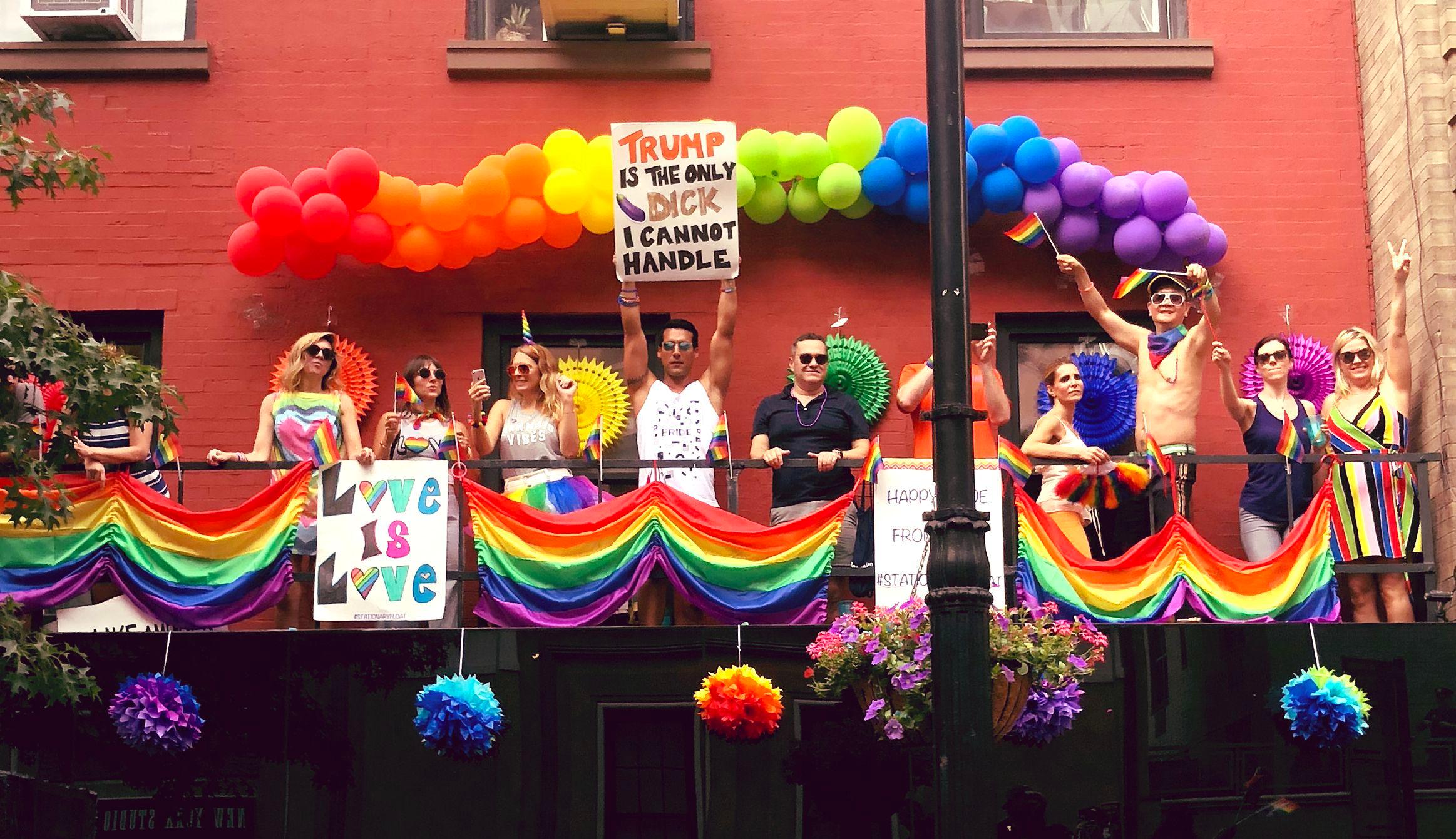
“TRUMP IS THE ONLY EGGPLANT EMOJI DICK I CANNOT HANDLE.”
Someone pointed and then tugged at Beasley to see whether he’d seen it. Everyone started laughing, with the balcony cheering at the exchange.
Even Silver, an attorney who is sometimes seen as stiff and serious, was uncommonly loose. In his shorts, he had this knee-bend dance thing going alongside his wife, who had the same knee-bend dance thing going—a reminder that everyone finds their person. But Silver was also playful, sneakily using a mini-squirt gun to shoot water at a few of the kids on the float, and then turning around as though it weren’t him, much to the kids’ confusion (and everyone else’s delight).
Bullock’s son at first seemed overwhelmed by the event, from the tight quarters of the float to the loud noise. But once towel-throwing became the norm, he too was tossing ’em into the crowd. Bullock would routinely check on him when he wasn’t caught up in the joy emanating from every block. I took a moment to look at his shoes and noticed something different about the tattoo on his left leg that I’d seen when we first sat down. Originally, I saw his sister’s name, as well as the date of her birth and death. What I hadn’t noticed before, above her name, in the same cursive font: “LGBTQ.” Bullock, standing over me, looked down at me looking at his leg. I looked up and smiled. Then I went back to dancing, hard.
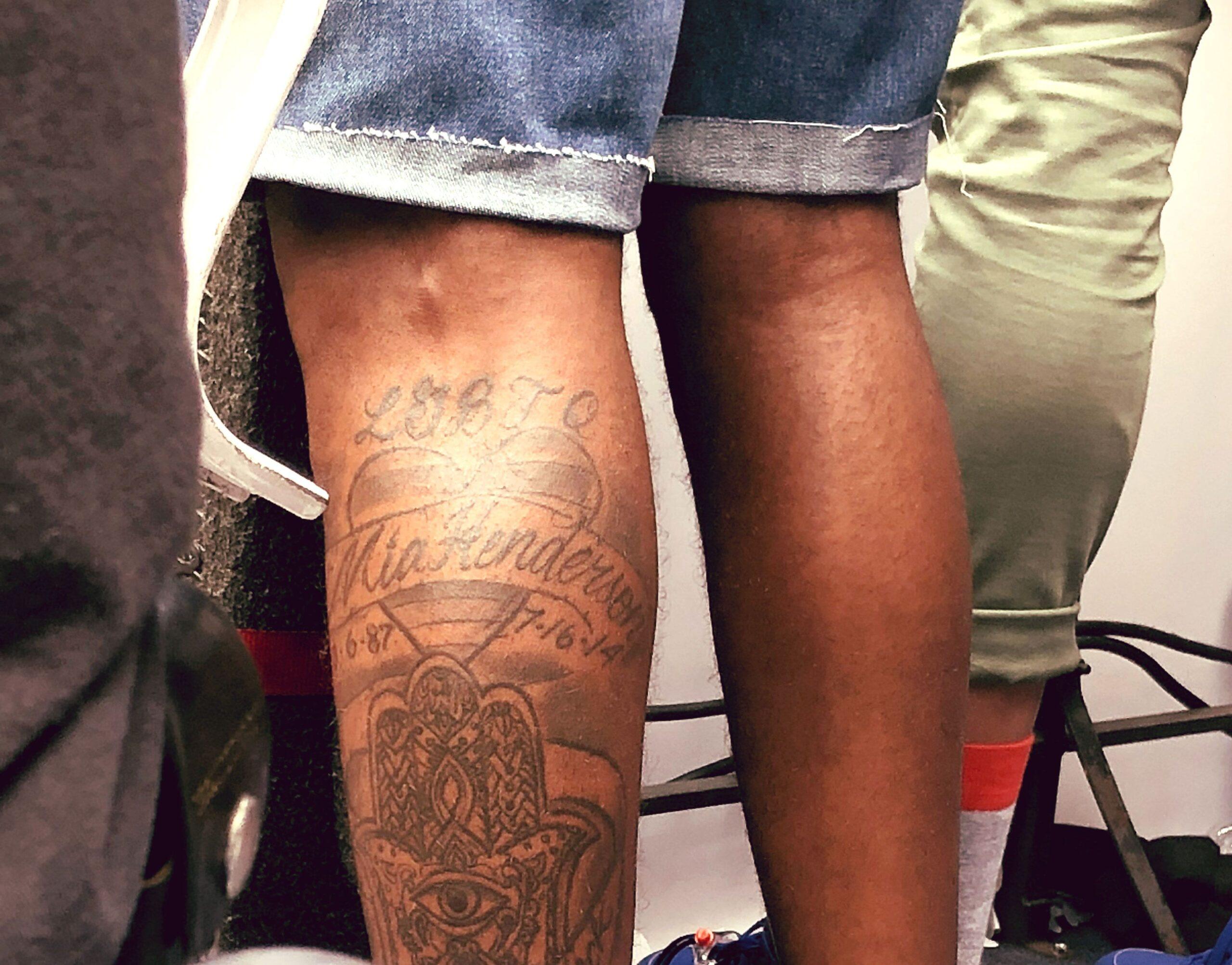
My attempt at laying low on the float was an exercise in futility. And it should have been—outside of Marathon Day, the Pride Parade is the most joyous day in New York City. And the smile on Bullock’s face as he waved his flag on his league’s float made it clear that this would not be his last Pride march. Bullock wants to do whatever he can to make the world better for transgender people. And if that means constantly throwing himself headlong into new environments to have new experiences, he’s ready.
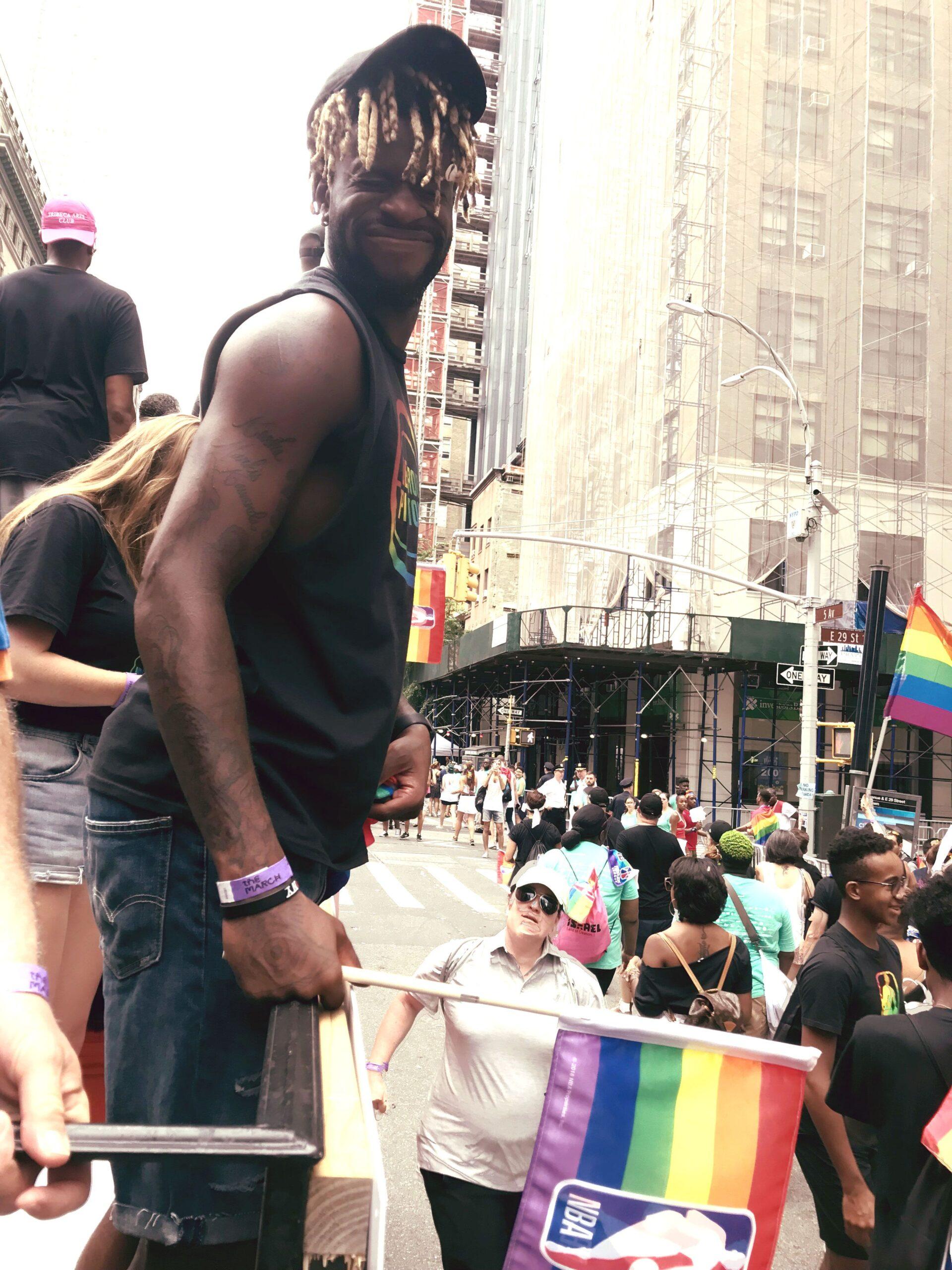
“I’m a person that plays sports as a straight man,” he says. “I want everyone to believe they can make it to the NBA. If they can compete at my level, that’s what I’m standing for—incorporating LGBT into sports. That and standing up for African American transgender women that have been murdered. That’s what I’m doing.”
Rembert Browne is a writer living in New York.